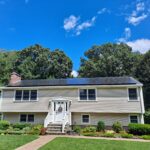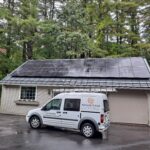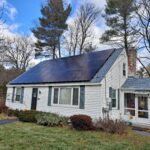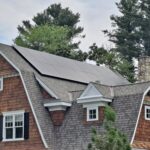I would love to say solar installers in the Northeast take the winter off, but they don’t. The work for PV contractors does not stop just because snow is on the ground or ice is on a roof. In the snowiest and coldest parts of winter, a lot of companies spend time catching up on design, engineering, rebate, and permitting work as well as outreach to their customers and the community. However, a majority of solar installers will still be doing evaluations. We just can’t afford not to!
I will be one of the first people to say that New England hasn’t been the most conducive climate for solar work in the last year. Massachusetts just had its second hottest summer on record and a roof can be 20 to 30 degrees warmer than the ground in full sun. I’m sure that doesn’t sound fun to most people! The winter hasn’t been too forgiving, either. With the latest storm bringing in 12 inches, a roof in Massachusetts could have accumulated more than 18 inches of snow. With the anticipated cold front, forecasters do not believe the snow will melt on its own.
That probably leaves you with two questions. Why do we still conduct solar evaluations in the winter, and how the heck do we do it? Once we sign a contract, it could be one to three months before we can start work depending on where you live. There are a few reasons why we can’t begin work immediately and most are beyond our control. The main issue is usually the state-run rebate programs. We are required to submit an application and wait until it is approved before we can start work. In one project, the state had our application for three months before we got the go ahead. If you have a municipal utility, the process is usually easier and rebates can be approved within a week. However, our company still has a few hurdles with engineering, permitting and interconnection, not to mention scheduling other projects, so one month is a good case scenario.
With the generous federal and state incentives available in Massachusetts and Connecticut, more and more homes and businesses are going solar. In the last quarter of 2010, Massachusetts gave rebates to install 167 PV systems that will generate 2.7 MW of renewable energy. The popularity is expected to grow, and the industry is running to catch up. Some of my customers have told me that other solar installers are scheduling five months out because of their current workload. My point is that homeowners and businesses should act now if they want panels installed by the spring or summer.
Let’s get back to how we conduct evaluations with 18 inches of snow on the roof. Many of our competitors will give you a simplified evaluation after filling out a phone or web survey. In one case, another solar company thought a roof was 20% bigger because they used a satellite image. As you can see, the data is often incorrect and production estimates can be incredibly inaccurate. We don’t work that way. We want to meet our customers in person and talk about their goals. We also want to take measurements of your orientation, roof, pitch, and shading, as well as examine your electrical service and roof structure. However, we will absolutely not go on a pitched roof if it is covered with ice or snow. We will rest our ladder against the home (business) and take shading measurements from the gutter line. These estimates will give us our worst case for shading and we will use these production estimates in our financial analysis. If a customer like what they see, we can start the process (at no cost or obligation) and do further analysis when the weather improves.
Electricity bills are highest in the summer. Don’t wait until the spring if you’re interested in solar power for your home or business. Because of the upfront work involved, it is best to get the process started. Brightstar Solar is a licensed solar installer that will work with our customers to navigate the installation process, maximize incentives, and manage the rebate and permitting paperwork involved. If you have a home or business in Massachusetts or Connecticut and are interested in solar power, please contact us for a free evaluation.








For those worried about the viability of solar panels in the winter or how to remove the snow, please see these related posts:
https://brightstarsolar.net/2010/12/cold-weather-snow-and-solar-power-in-new-england/
https://brightstarsolar.net/2010/12/how-to-remove-snow-from-solar-panels/
Pingback: Tweets that mention Why Solar Installers Conduct Evaluations in the Winter — BRIGHTSTAR SOLAR -- Topsy.com
That looks like my front window about now …I’m glad to see this explanation of why you shoudl get an evaluation in the winter. There is only continued growth in the future of the solar industry. I don’t think a lot of people realize that billions of dollars are saved by solar power each year in the U.S. Solar panels tied to the electrical grid actually help minimize the number of power outages that cost the country a small fortune each year.